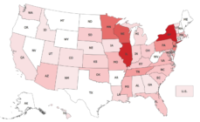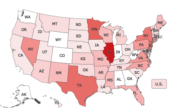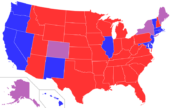 Newspapers in Missouri are going on the offensive in their battle to save public notice in their state.
Newspapers in Missouri are going on the offensive in their battle to save public notice in their state.
Fighting separate bills that would move all government and foreclosure notice in the state from newspapers to government and law-firm websites, the Missouri Press Association (MPA) threw its support behind Senate Bill 515, introduced last week on the final day for filing new legislation in Jefferson City. SB 515 would require newspapers in the state that publish notices to also post them on MPA’s statewide public notice site. It would also limit rates by requiring newspapers to include volume or repeat-buyer discounts, and by mandating lower prices for “second and successive insertions”.
Missouri, Indiana face high-stakes battles
 As the new year dawned and state legislatures reconvened in January, two press associations in the Midwest found themselves in an existential battle to save newspaper notice in their states. The Missouri Press Association (MPA) and the Hoosier State Press Association (HSPA) are fighting several bills with serious prospects for passage that would move government and foreclosure notices to the web.
As the new year dawned and state legislatures reconvened in January, two press associations in the Midwest found themselves in an existential battle to save newspaper notice in their states. The Missouri Press Association (MPA) and the Hoosier State Press Association (HSPA) are fighting several bills with serious prospects for passage that would move government and foreclosure notices to the web.
The Year in Public Notice Legislation
 Despite a bit of early angst in a few states, 2018 ended up being a relatively benign year for public notice.
Despite a bit of early angst in a few states, 2018 ended up being a relatively benign year for public notice.
PNRC has tracked about 160 separate public notice bills this year, just a bit more than in 2017. Only 24 were enacted into law and most were vanishingly minor. As is generally the case with minor public notice legislation, almost all of the notice changes were incidental to the primary focus of the legislation. For example, a bill in New Jersey added several new instances of both newspaper and government website notice in connection with public-private partnership agreements for certain building and highway infrastructure projects.
N.C. Papers File Suit to Block Guilford County Law
 Four newspaper companies publishing in Guilford County filed suit this afternoon alleging that a law passed last year by the General Assembly allowing the county to publish and sell public notices on its own website violates the North Carolina Constitution. The companies are asking the Superior Court of Wake County Superior Court to award money damages and issue a permanent injunction preventing the law from being enforced.
Four newspaper companies publishing in Guilford County filed suit this afternoon alleging that a law passed last year by the General Assembly allowing the county to publish and sell public notices on its own website violates the North Carolina Constitution. The companies are asking the Superior Court of Wake County Superior Court to award money damages and issue a permanent injunction preventing the law from being enforced.
Governor Vetoes Public Notice Bill in Colorado
 Colorado Gov. John Hickenlooper yesterday vetoed a bill that would have substantially reduced a category of newspaper notice in the state beginning in 2022.
Colorado Gov. John Hickenlooper yesterday vetoed a bill that would have substantially reduced a category of newspaper notice in the state beginning in 2022.
Senate Bill 156 would have allowed counties to publish salary reports, financial statements and monthly expense reports on their own websites in lieu of newspapers. The legislation would still have required counties to publish newspaper notices providing a website address for each report.
It’s Shaping up to Be a Good Year for Public Notice
 A great deal of bad legislation died when 15 more state legislatures adjourned in May, including bills in five states that would have removed all or large segments of public notice advertising from newspapers.
A great deal of bad legislation died when 15 more state legislatures adjourned in May, including bills in five states that would have removed all or large segments of public notice advertising from newspapers.
The most significant legislation to expire was a bill in Missouri that was close to passage and would have shifted foreclosure notices from newspapers to mortgage-trustee websites. Missouri House Bill 1651 and its Senate companion were both voted out of committee following hearings earlier this year, but neither got to the floor for a vote before the legislature packed it in for the year in mid-May.
Foreclosure Bill on Move in Missouri; Some Notices Eliminated in Kentucky
 A bill that would allow mortgage trustees in Missouri to publish foreclosure notices on websites rather than newspapers picked up momentum yesterday afternoon when it received a favorable vote in the House Legislative Oversight Committee. The next step is the House floor.
A bill that would allow mortgage trustees in Missouri to publish foreclosure notices on websites rather than newspapers picked up momentum yesterday afternoon when it received a favorable vote in the House Legislative Oversight Committee. The next step is the House floor.
SB 909 is widely believed to be an effort by trustees in this nonjudicial foreclosure state to profit off the notices they are required to publish before auctioning delinquent properties to the highest bidders. Two of the largest trustee law firms in Missouri have been the primary proponents of the legislation.
Legislative Front Still Calm
 The first quarter has ended and the legislative front remains relatively calm. Missouri is still the only state in immediate peril of passing a major public notice bill, but even there newspapers are beginning to see light at the end of the tunnel; the two measures that have given public notice advocates in the Show Me State cause for concern didn’t budge last month.
The first quarter has ended and the legislative front remains relatively calm. Missouri is still the only state in immediate peril of passing a major public notice bill, but even there newspapers are beginning to see light at the end of the tunnel; the two measures that have given public notice advocates in the Show Me State cause for concern didn’t budge last month.
Many bad public notice bills still litter the committees of the 30+ state legislatures that haven’t adjourned yet, but none appear to have any momentum. Nevertheless, several minor bills — some that add newspaper notice and a few that reduce it — have passed so far this year. Here’s the round up.
Missouri Only State in Present Public Notice Peril
 An election year? A surge in passion for government transparency? A growing admiration among state legislators for their local newspapers? Whatever the reason, the state of public notice in the U.S. remains unseasonably calm for this time of the year.
An election year? A surge in passion for government transparency? A growing admiration among state legislators for their local newspapers? Whatever the reason, the state of public notice in the U.S. remains unseasonably calm for this time of the year.
Lots of public notice-related legislation has been introduced — PNRC is tracking more than 200 bills — but so far most of it hasn’t gone anywhere. There have been pockets of activity over the last month, however. Here are the highlights.
State Legislatures Back; Public Notice Safe for Now
 The New Year again brought with it a flood of new legislation curtailing the role of newspapers as the official source of public notice. Fortunately, none of the new bills appear to be an immediate threat and several have already been killed in committee or face imminent demise.
The New Year again brought with it a flood of new legislation curtailing the role of newspapers as the official source of public notice. Fortunately, none of the new bills appear to be an immediate threat and several have already been killed in committee or face imminent demise.
Here’s an overview of some of the states that have been most active since legislatures returned to work.
